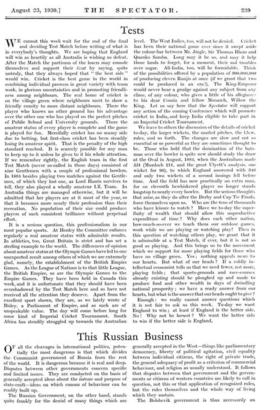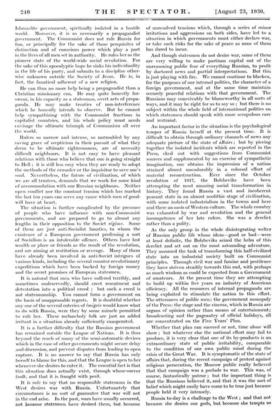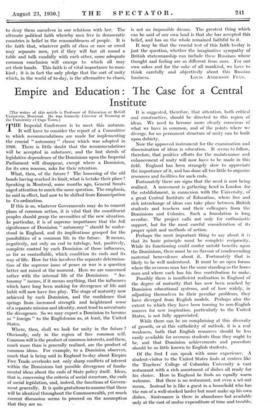This Russia n Business
OF all the cleavages in international politics, poten- tially the most dangerous is that which divides the Communist government of Russia from the rest of the world. It is dangerous because it is real and deep. Disputes between other governments concern specific and limited issues. They are conducted on the basis of generally accepted ideas about the nature and purpose of state-craft—ideas on which canons of behaviour can be readily built up.
The Russian Government, on the other hand, stands quite frankly for the denial of many things which are
generally accepted in the West—things like parliamentary democracy, liberty of political agitation, civil equality between individual citizens, the right of private trade, the general adequacy of profit as a criterion of commercial behaviour, and religion as usually understood. It follows that disputes between that government and the govern- ments or citizens of western countries are likely to call in question, not this or that application of recognized rules, but the rules themselves and the whole way of living which they sustain.
The Bolshevik government is thus necessarily an Islunaelite government, spiritually isolated in a hostile world. Moreover, it is as necessarily a propagandist government. The Communist does not rule Russia for fun, or principally for the sake of those perquisites of distinction and of conscious power which play a part in the lives of all men set in authority. He rules her as the pioneer state of the world-wide social revolution. For the sake of this apocalyptic hope he sinks his individuality in the life of his party, and submits to a discipline other- wise unknown outside the Society of Jesus. He is, in fact, the fanatical adherent of a new religion.
He can thus no more help being a propagandist than a Christian missionary can. He may quite honestly for- swear, in his capacity as a statesman, overt acts of propa- ganda. He may make treaties of non-interference which he honestly intends to observe. But he cannot help sympathizing with the Communist fractions in capitalist countries, and his whole policy must needs envisage the ultimate triumph of Communism all over the world.
Rulers so narrow and intense, so untroubled by any saving grace of scepticism in their pursuit of what they deem to be ultimate righteousness, are of necessity difficult neighbours. It is not easy to have pleasant relations with those who believe that one is going straight to Hell ; it is still less easy when they are ready to adopt the methods of the crusader or the inquisitor to save one's soul. Nevertheless, the future of civilization, of which we are all trustees, demands that we work for some kind of accommodation with our Russian neighbours. Neither open conflict nor the constant tension which has marked the last ten years can serve any cause which men of good- will have at heart.
The situation is further complicated by the presence of people who have influence with non-Communist governments, and are prepared to go to almost any lengths in their opposition to the Soviet regime. Some of them are just anti-Socialist fanatics, to whom the existence of a European government professing a sort of Socialism is an intolerable offence. Others have lost wealth or place or friends as the result of the revolution, and arc aiming at restitution or revenge. Many of them have already been involved in anti-Soviet intrigues of various kinds, including the several counter-revolutionary expeditions which have been backed by foreign money and the secret promises of European statesmen.
It is natural that men who have suffered terribly, and sometimes undeservedly, should erect resentment and detestation into a political creed ; but such a creed is not statesmanship. You cannot form a government on the basis of unappeasable regrets. It is doubtful whether any one of the several coteries of emigres would know what to do with Russia, were they by some miracle permitted to rule her. These melancholy folk are just an added irritant in a situation already sufficiently exasperated.
It is a further difficulty that the Russian government has remained outside the League of Nations. It is thus beyond the reach of many of the semi-automatic devices which in the case of other governments might secure delay and discussion, and prevent disputes from leading to open rupture. It is no answer to say that Russia has only herself to blame for this, and that the League is open to her whenever she desires to enter it. The essential fact is that this situation does actually exist, through whose-soever fault, and that it is fraught with peril.
It is safe to say that no responsible statesman in the West desires war with Russia. Unfortunately that circumstance is no sort of guarantee that war will not in the end arise. In the past, wars have usually occurred, not because statesmen have desired-them; but because of unresolved tensions which, through a series of minor irritations and aggressions on both sides, have led to a situation in which governments must either declare war, or take such risks for the sake of peace as none of them has dared to incur.
And though statesmen do not desire war, some of them are very willing to make partisan capital out of the unreasoning public fear of everything Russian, to profit by doctored news and partial interpretations. But this is just playing with fire. We cannot continue to blacken, for the purposes of our internal politics, the character of a foreign government, and at the same time maintain securely peaceful relations with that government. The Russians may conceivably be blameworthy in all sorts of ways, and it may be right for us to say so ; but there is no subject within the whole field of international politics on which statesmen should speak with more scrupulous care and restraint.
An important factor in the situation is the psychological temper of Russia herself at the present time. It is difficult to obtain through ordinary channels of news any adequate picture of the state of affairs ; but by piecing together the isolated incidents which are reported in the Press, eked out with suggestions from Communist sources and supplemented by an exercise of sympathetic imagination, one obtains the impression of a nation strained almost unendurably in a colossal effort of material reconstruction. Ever since the October revolution of 1917, the Bolsheviks have been attempting the most amazing social transformation in history. They found Russia a vast and incoherent peasant state in an almost neolithic stage of civilization, with some isolated industrialism in the towns and here and there an oasis of Western culture. The whole country was exhausted by war and revolution and the general incompetence of her late rulers. She was a derelict rather than a polity.
As the only group in the whole disintegrating welter of Russian public life whose ideas—good or bad—were at least definite, the Bolsheviks seized the helm of this derelict and set out on the most astounding adventure. They assumed the task of transforming this half-civilized state into an industrial society built on Communist principles. Through civil war and famine and pestilence they have striven steadily towards this end, with perhaps as much wisdom as could be expected from a Government of amateurs. At the present time they are attempting to build up within five years an industry of American efficiency. All the resources of internal propaganda are being exploited to stimulate the nation to this effort. The utterances of public men; the government monopoly of the Press: the stage and the cinema, which in Russia are organs of opinion rather than means of entertainment; broadcasting and the pageantry of official holidays, all are concentrated on the Five Years' Plan.
Whether that plan can succeed or not, time alone will show ; but whatever else the national effort may fail to produce, it is very clear that one of its by-products is an extraordinary state of public irritability, comparable to the condition of our own public mind during the crisis of the Great War. It is symptomatic of the state of affairs that, during the recent campaign of protest against religious persecution, the Moscow public really believed that that campaign was a prelude to war. This was, of course, fantastically untrue ; but the important thing is that the Russians believed it, and that it was the sort of belief which might easily have come to be true just because people held it very intensely.
Russia to-day is a challenge to the West ; and that not because she denies our gods, but because she tempts us to deny them ourselves in our relations with her. The ultimate political faith whereby men live in democratic countries is belief in the reasonableness of people. It is the faith that, whatever gulfs of class or race or creed may separate men, yet if they will but sit round a table and talk candidly with each other, some adequate common conclusion will emerge to which all may set their hands. This faith is of vital importance to man- kind ; it is in fact the only pledge that the sort of unity which, in the world of to-day, is the alternative to chaos, is not an impossible dream. The greatest thing which can be said of our own land is that she has accepted this belief, and has on the whole remained faithful to it.
It may be that the crucial test of this faith to-day is just the question, whether the imaginative sympathy of British statesmanship can include these Russians whose thought and feeling are so different from ours. For our own sakes and for the sake of all mankind, we have to think carefully and objectively about this Russian business. Louts ANDERSON FENN.


































 Previous page
Previous page